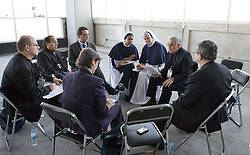Think of a time when you were upset, really teed off about something, perhaps at the closing hour of a family dinner, when the conversation turned to politics or, perhaps more controversially, another family member, the hour of the night when ESPN is recycling highlights and the dog has barked himself into one of those luxurious kitchen-floor sleeps that makes him sweetly and enviably oblivious to the bickering human world.
Whatever the issue was, you really cared about it. And perhaps you knew the issue well. You knew most of the facts, most of the complexities, most of the pros and cons. You had wowed some people before with your knowledge on the topic.
Now remember that threshold moment: the moment you realized, to your great shame, that on a major point, on a key matter in the tussle, you had been beaten. But notice also what you did: you pretended that nothing happened. You kept arguing, kept making your point, perhaps citing articles you hadn't read, books that hadn’t been published, and facts that were possibly or formerly true. You rolled your eyes and shook your head, and became an expert on whatever you needed to -- international finance, capital punishment, the Westminster Dog Show.
The most important thing about this transformation is that, at that moment, it was about winning the argument, which means appearing to have won the argument. It was about saving your reputation and your cherished principles.
We’ve all been there, or near there. And one of the most startling things about those moments is how little guilt we feel when they happen. On the drive home, we feel bad not that we were wrong, not that we relied on impossible statistics or bad arguments, or, worse, that we lied, but that we got beat. That we were embarrassed. Perhaps the discussion did start out at a basically rational level, with both parties seeking truth; but at some point, it drifted away from that noble center.
That humans do this reveals something about the power of knowledge and the power of rational discourse. It's a small example that confirms what common sense and social science have indicated for a long time on a larger scale: that what we say, and how we act, often do not result from a dispassionate analysis of the facts or from much analysis at all.
Think of the legal profession. The culture has an impression of lawyers as rational and analytical (and plenty are), but that’s also because the legal system does its best to make them that way. The rules of civil procedure, the rules of evidence, and the rules that govern juries (just to name a few) are designed as meticulously as they are largely because of the non-rational factors that influence judgment and decision-making (sorry to A Few Good Men fans: real lawyers don’t get to deliver speeches in the midst of cross-examinations).
But law is just the beginning of it. As Ori and Ron Brafman have noted in their book Sway: The Irresistible Pull of Irrational Behavior, decisions concerning relationships, war and peace, the hiring of employees, management of risk, the selection of professional athletes, and virtually every other area of human life are affected, in some cases fatally, by the human tendency to listen to the irrational.
It doesn't mean that humans are clueless, nor does it mean we ought to ignore non-cognitive paths to insight. Rather, it means that judgment is complicated. The process of knowing is complicated. As Fr. Robert Barron observed in his book The Strangest Way: Walking the Christian Path, “our assent to a given idea is the consequence of a long and complex process, involving reasoning to be sure, but also hunch, intuition, prejudice, life experience, the example of great people who have made such an assent and the counterexample of bad people who have failed to do so.”
To develop a healthy, authentic religious life, our malleable minds require a diversity of experiences and a period of trial and error. Someone might be drawn toward the Catholic faith not by the documents of Vatican II but the diaries of Dorothy Day. Someone unmoved by contemplative prayer might be captivated by the intellectual rigor of Thomas Aquinas. To someone with a terrible childhood, emphasizing submission to authority may undercut a hopeful relationship blossoming with a nearby parish. A conscience stuck in acedia might be uplifted by a dash of prophetic rhetoric.
The point is, we just don’t know what combination of factors will alight the path of faith and inspire people to move forward. We do know, however, that Christ calls us to a radical, life-altering journey that transforms our spiritual genome. This change cannot be rushed into existence or reduced to a political issue. It involves a relationship with the Creator who loved us into existence, a relationship that, like all others, best prospers with support, encouragement, patience, and love.








